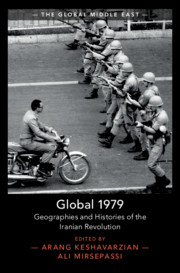Book contents
- Global 1979
- The Global Middle East
- Global 1979
- Copyright page
- Dedication
- Contents
- Figures
- Tables
- Contributors
- Acknowledgments
- Maps
- Orientations
- Part I Global Shadows
- 3 Seeing the World from a Humble Corner:
- 4 Iranian Diasporic Possibilities:
- Part II Militarized Cartographies
- Part III Hidden Genealogies
- Part IV Circulating Knowledge
- Part V Aspirational Universalisms
- Select Bibliography
- Index
4 - Iranian Diasporic Possibilities:
Tracing Transnational Feminist Genealogies from the Revolutionary Margins
from Part I - Global Shadows
Published online by Cambridge University Press: 01 July 2021
- Global 1979
- The Global Middle East
- Global 1979
- Copyright page
- Dedication
- Contents
- Figures
- Tables
- Contributors
- Acknowledgments
- Maps
- Orientations
- Part I Global Shadows
- 3 Seeing the World from a Humble Corner:
- 4 Iranian Diasporic Possibilities:
- Part II Militarized Cartographies
- Part III Hidden Genealogies
- Part IV Circulating Knowledge
- Part V Aspirational Universalisms
- Select Bibliography
- Index
Summary
This chapter examines the gender and sexual politics of the Iranian Students Association (ISA), the US affiliate of the Confederation of Iranian Students (National Union) (CISNU), which was the largest anti-shah opposition formation during the 1960s and 1970s. While the participation of CISNU in the creation of pan-Third Worldist solidarities has been established, Iranian foreign student activists have been left out of narratives of the emergence of Third World feminism as an outgrowth of women’s commitments to the anti-imperialist movements of the era. The author argues that the efforts of some ISA members to challenge gender hierarchies, and to place the struggle for women’s equality on the immediate organizing agenda – rather than postpone this goal until after the arrival of socialism – represent gestures toward an anti-imperialist feminism that was severely constrained by historical and ideological circumstances. Nonetheless, these gestures are important for subsequent generations of Iranian diasporic feminists to parse, as they contain ideas crucial for reimagining transnational feminist solidarities today. Through close readings of interviews with former ISA members and movement literature, the author traces a genealogy of Iranian revolutionary gender consciousness rooted in an analysis of the intersections between patriarchy, empire, and dictatorship.
- Type
- Chapter
- Information
- Global 1979Geographies and Histories of the Iranian Revolution, pp. 104 - 138Publisher: Cambridge University PressPrint publication year: 2021
- 11
- Cited by



